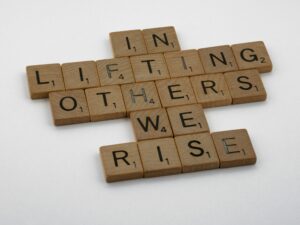Striving for Fairness
 Last week, I wrote about the ideas behind paying taxes and student fees for programs and services that we might never use. I see it as paying my fair share even if in the case of taxes my fair share may be different that someone else’s. This of course raises the question, what share is fair?
Last week, I wrote about the ideas behind paying taxes and student fees for programs and services that we might never use. I see it as paying my fair share even if in the case of taxes my fair share may be different that someone else’s. This of course raises the question, what share is fair?
Such a complicated topic. I can think of way too many ways to address it. First was my childhood whine to my parents that something they were doing “wasn’t fair.” Ours was a no-whining household and the most consistent response to that claim was my mom’s “Whoever told you life was fair?”
Then there’s the way to cut down arguments about fairness between two parties. Person A cuts the cookie and Person B gets to pick which piece they want to eat. Even that only works if the two people have equal power in their relationship.
Years ago, a colleague who was giving a presentation on leading a balanced life famously said, “Balance is in the eye of the liver.” The entire room looked at her quizzically as several tried to figure out if there was something called an eye in our livers and then realized we were the livers of our lives. Very complicated. But in the same way, understanding fairness is often based in our own individual perspectives and life experiences.
It’s often true that a conversation on fairness will begin with a simple principle – treat everyone the same. Sounds good, but then, of course, one by one, most people will realize that they have a special circumstance and due to that circumstance, they need a slightly different treatment for things to be fair. This kind of fairness is the fundamental challenge of the work I used to do particularly in student conduct. We needed to be fair in our dealings with a wide variety of people who had done a wide variety of things for an even wider variety of reasons. And we had a value of working with each person we met with as an individual.
My work in conduct has resulted in me not being a fan of “zero tolerance” programs. They sound fair. Until you try to apply them. A policy of no drugs in elementary school leads to children sent home for having an aspirin. At every educational level, it leads to students being assessed the same sanction for vastly different levels of behavior. Most people then say, wait that’s not fair.
At the collegiate level, campuses that have single sanction policies, ie, any violation of an honor code results in suspension, often find their hearing boards twisting the system to achieve fairness. If a panel feels that suspension is too harsh for the action, they might find there was no violation even when there clearly was one. That result feels more “fair”. But then there is no consequence for the misdeed which doesn’t seem right either. (And a variety of campuses have put underage drinking outside of honor codes for just this reason.)
It’s much simpler to have a no tolerance or single sanction system, but I think those of us who take on the work of leadership also take on the challenge of finding the balance between being consistent across the whole and determining the most appropriate response for the individual(s) involved.
All this to end up back where I started – such a complicated topic, but an important one. If we don’t work at treating others fairly, creating fair systems, and making fair decisions, then we end up with a world that isn’t fair for anyone. If we’re not willing to pay our fair share, we certainly can’t expect others to do so. Fairness means we take a fair share rather than the biggest share when given the choice. Fairness means trying to understand as many sides of a problem as possible and then making the best decision one can, even if it’s not perfect. Being fair is finding a way forward that helps rather than harms others. Striving for fair, equitable organizations is the fundamental work of leadership. Working at being fair is a task for everyone of us every day. What fairness challenge have you faced this week?
Here’s to each of us working to create a fairer world.
Take care,
Gage
